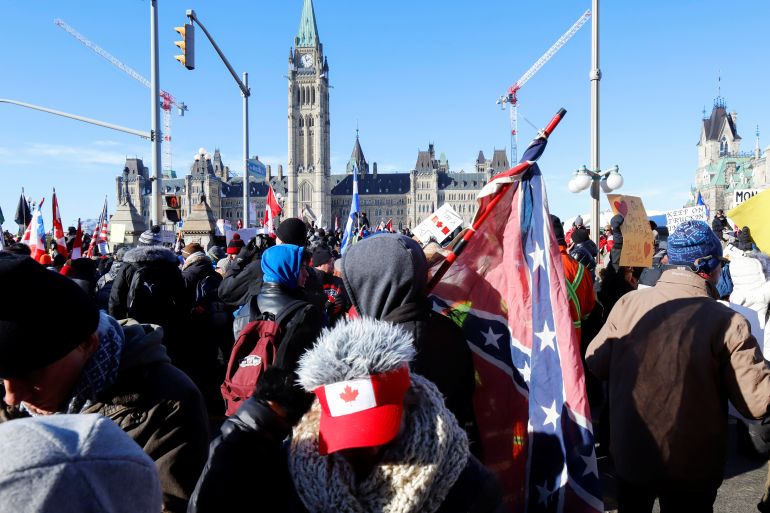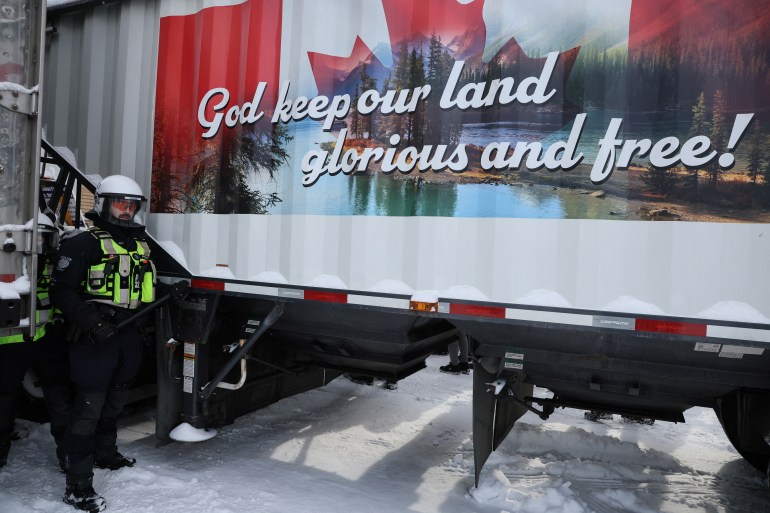As US grapples with January 6, Canada ‘shouldn’t be complacent’
US Capitol riot hearings should push Canadians to fight far-right rhetoric and disinformation in their own country, experts say.

Montreal, Canada – As the United States grapples with far-right extremism and threats to its democratic institutions in fresh January 6 Capitol riot hearings, experts in Canada say the nation should not view what happened south of the border as an isolated incident.
Distrust in government – and the threat of populist violence – also pose a growing problem in Canada, analysts argue, pointing to recent protests that paralysed the capital Ottawa as only one of the most recent examples.
Keep reading
list of 3 itemsWhat is behind the rise of the far right in France?
What the truckers’ convoy revealed about policing in Canada
“There’s no doubt that Canadians seem to take far more interest in events south of the border than they do in their own country … But we also have to be careful not to lull ourselves into a false sense of security,” said Donald Abelson, director of the Brian Mulroney Institute of Government at St Francis Xavier University in Nova Scotia.
“The people we elect to public office need to be on guard and they need to understand that the January 6 insurrection may have been felt around the world, but we shouldn’t be so confident or complacent in thinking that it cannot happen here,” Abelson told Al Jazeera.
“How many people would have expected that you would have a convoy that basically hijacked the nation’s capital in our country for three weeks? Who would have expected that?”
Rise of the far right
So-called “Freedom Convoy” demonstrators descended on Ottawa from across the country in late January, paralysing the city’s downtown core in what residents called an “occupation”. The movement was led by far-right activists, and Canadian media reported that some supporters had said they hoped the convoy would usher in “our own January 6 event”.
But while the Capitol riot may have helped activists in Canada aspire to something similar, the rise of far-right rhetoric in the country of 38 million people – two-thirds of whom live within 100km (62 miles) of the US border – goes back long before the convoy, or the US insurrection.
For years, Black, Indigenous and Muslim communities in Canada have raised alarm at the prevalence of white supremacist ideologies and far-right groups, and their fears have grown in the aftermath of deadly, racist attacks in Quebec City and London, Ontario, among other places.
The number of hate groups has increased dramatically (PDF) across the country, while white nationalism remains a problem in key government institutions such as the Canadian military and law enforcement agencies, according to recent studies and media investigations. Meanwhile, far-right ideologies and conspiracy theories are drawing new audiences online amid widespread anxieties over COVID-19, inflation and other issues.
In a report (PDF) released late last month, Canadian researchers at the University of Ottawa’s Graduate School of Public and International Affairs found that “ideologically motivated violent extremism poses a growing threat to Canadian national security”.
The Ottawa occupation, and affiliated “Freedom Convoy” blockades at US-Canada border crossings, brought this point home, they said, while threats to politicians and vulnerable groups also are mounting.
“Individuals and groups who adhere to a diffuse range of violent, far-right ideologies have become better organized and emboldened in the wake of the events of early 2022,” the researchers wrote.
“They have developed or increased ties to like-minded actors in the United States and elsewhere. Whether anti-government, antisemitic, Islamophobic, anti-Asian, or misogynistic in nature, these groups reflect global trends that must be addressed at their roots.”
Conspiracy theories
Yet many Canadians remain much more focused on what is going on in the US – the superpower that holds tremendous influence over the nation’s politics and culture – than on the alarming trends happening in their own country, experts say.
This is despite the fact that much of the disinformation that the mob of former US President Donald Trump’s supporters espoused on January 6 also has taken hold in Canada, said Carmen Celestini, an instructor at the University of Waterloo and expert on conspiracy theories.
An Abacus Data survey released this week showed that 37 percent of Canadians – or 11 million people – believe “there is a group of people in this country who are trying to replace native born Canadians with immigrants who agree with their political views”. That false idea – what’s known as the Great Replacement conspiracy theory – has been linked to white supremacist attacks around the world, including a recent shooting in Buffalo, New York that left 10 Black people dead.
“People mock conspiracy theories and disinformation … but because we spend time mocking it and not taking it seriously – not just now, but historically – we see the repercussions of that. And the repercussions of that are what happened on January 6,” Celestini told Al Jazeera.

She pointed out that the husband of one of the “Freedom Convoy” organisers told a Canadian judge during a bail hearing that he thought the protest was allowed under the “First Amendment”, referring to the freedom of speech and assembly provisions of the US Constitution.
“We’re in Canada, we don’t have that. But that dissolving of the border is real to many people,” said Celestini, adding that with conspiracy theories crossing national borders online, too, it is important for governments to combat them in a coordinated way.
“We are not immune to this,” she said. “We have politics here now where conspiracies are spoken from the pulpit of politicians. And we see name-calling, we see things and actions that we haven’t seen in the past but seem to be acceptable now.
“And that was what was occurring down there [in the US],” she added, stressing that it is critical that Canadians start “recognising the similarities and doing something before it goes too far”.